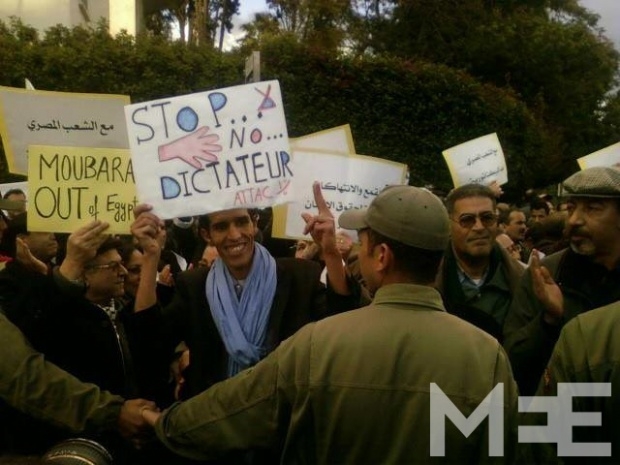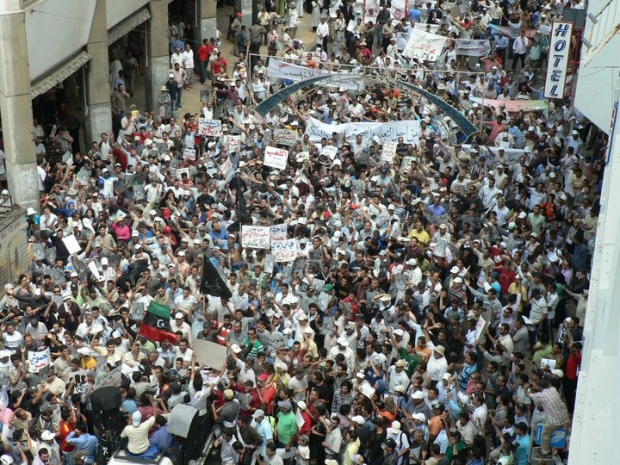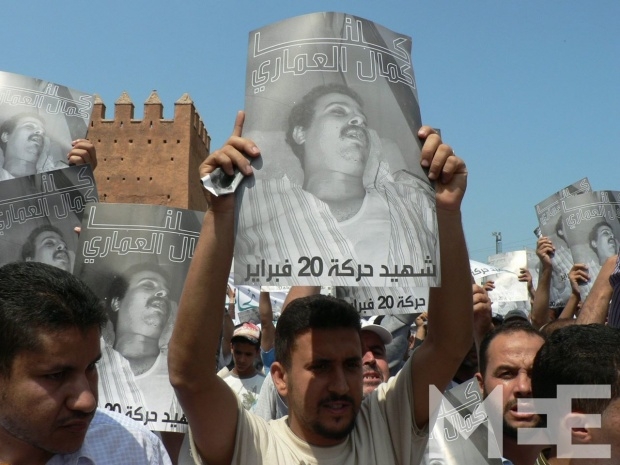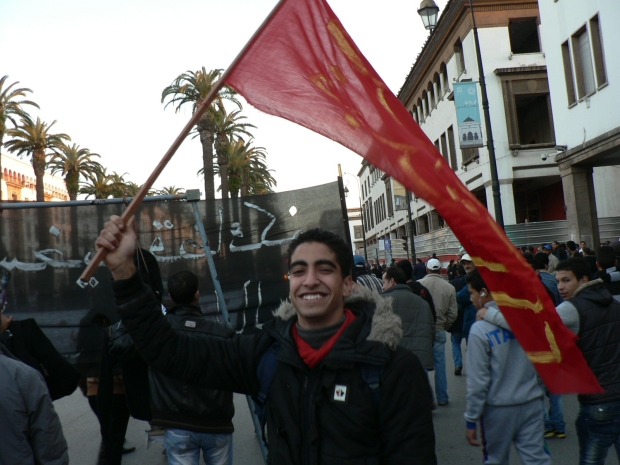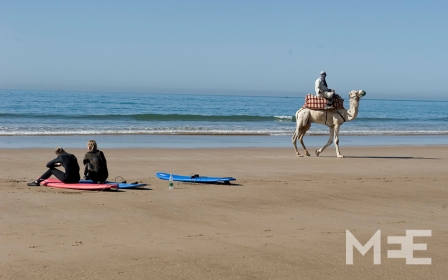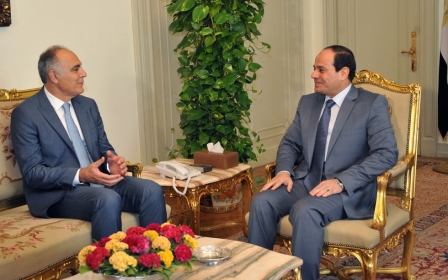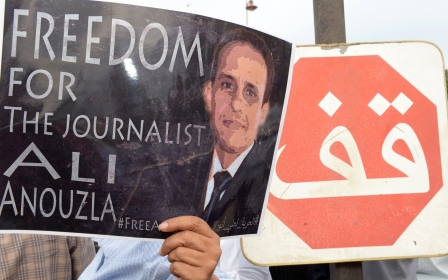Inside the movement: what is left of Morocco’s February 20?
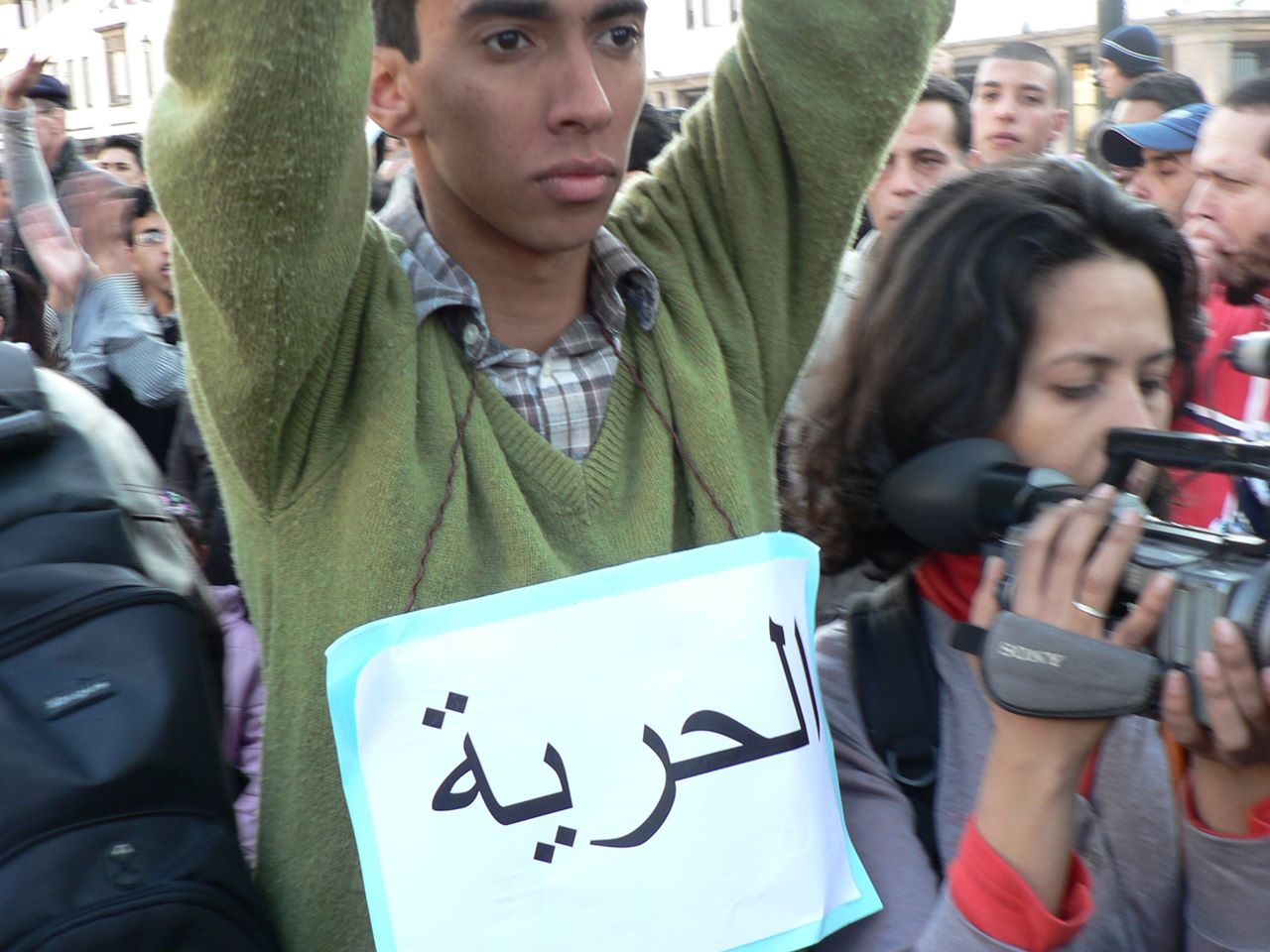
RABAT – This past weekend saw the fourth anniversary of Morocco’s February 20th movement, the pro-democracy uprising that pushed the country’s king to announce reforms weeks after it launched.
Here in the city where the movement began with thousands of people taking to the streets in 2011, 200 or so people came out for a sit-in on Friday and a protest on Sunday to observe the anniversary. Protests were also held in Casablanca and Agadir, and other cities across the country.
After two hours in Rabat on Sunday, the protest ended, people scattered and life in the capital grew quiet again with little trace of the anniversary - which is how, four years after the founding of the movement that kindled Morocco’s uprisings, many of its members say they feel about the movement's impact and its future.
Today, February 20’s general assemblies – once held in dozens of town squares and villages across the country – now only occasionally take place in a few cities like Rabat and Casablanca. Heated discussions that once centred on politics, social justice and ending corruption have shrunk to technical issues like when and how to organise protests.
Most founding members of February 20 rarely attend meetings anymore, even if they continued to protest until recently. Others say they barely recognise the movement they initiated. And yet, despite constitutional reforms announced in the aftermath of the first 2011 protests and hailed by the international community, most activists say they feel no real political progress has been made.
"The arrogance of the state has come back,” said Mohamed Lmossayer, a journalist and founding member of February 20’s Rabat coordination group and a longtime member of ATTAC Maroc, an anti-globalisation NGO. “What the state has given us with the right hand, it has taken back with the left.”
"We have gone back to the pre-February 20 situation,” said Ayoub Lhafidi, a 26-year-old economics student and another member of ATTAC Maroc.
Lhafidi and Lmossayer say the makhzen – the name used to describe the undefined system of power stemming from the king – has slowly stifled their movement. At least 2,000 activists have been detained by the authorities since the unrest of 2011, according to the Moroccan Association of Human Rights (AMDH).
Many of those 2,000 were released, sometimes after only a few hours. But dozens of others were charged and later sentenced for common-law crimes like possession of hashish, “humiliating the police” and selling cigarettes without a permit.
Moroccan authorities maintain there are no political detainees in the country. But AMDH has said that authorities use the pretext of common-law crimes to cover up politically motivated incarceration.
As a result of the lock ups, rather than protesting for political reforms, February 20 members activists say for the past two years, they have spent most of their energies on the release of political prisoners, holding solidarity sit-ins outside jails and courts. The movement's monthly protests now pale in comparison to protests held before detentions suddenly started to rise in 2012.
The Beginnings
The February 20 movement was born in 2011 as a result of interactions between tech-savvy Moroccan youngsters and street activists inspired by the Tunisian and Egyptian uprisings that had started days before. Many of the leaders of the group were young people who had, for the most part, experience as activists, but had participated in groups that had little previous connection.
As protests grew in Tunisia and Egypt, Moroccan youngsters started to express their support for the protests on Facebook, but carried the conversation further, discussing political reforms in their own country, activists say.
One Facebook page, "Moroccans converse with the King" became the basis of the future mobilisation. Later changed to the "Freedom and Democracy now" page, it was a place where young Moroccans debated how they would create their own protest movement and where they set the demands that eventually became the basis of the movement’s founding document.
But it was a street gathering that eventually brought February 20 together. It was January 2011 and a group of young Moroccans gathered in front of the Tunisian embassy in Rabat to express support for the revolution.
On 9 March, after protests had spread nationwide, King Mohamed VI announced constitutional reforms. Many activists and observers met the king’s announcement with immediate suspicion, and protests grew to more than 100 cities until they were met with violent repression in May.
Slow Downfall
Soon after the king’s announcement, some activists, mainly from leftist political parties, started to adjust their demands and push for a parliamentary monarchy, a watering down of demands that divided the movement, explained Lmossayer.
“Half the activists started to debate on this,” he said.
By the end of March, there were signs that in the diverse beginnings and loose hierarchy that had been the movement’s strength, the seeds of its downfall had been sown.
In Rabat, where the movement began, founding members accused youth activists belonging to several leftist parties and to the Islamist Party of Justice and Development’s youth movement, Baraka, of manipulating February 20 as a way to bolster their own agendas.
Trade union support fell apart as early as the end of April when authorities neutralised the organisations by securing higher salaries for civil servants and promising jobs to unemployed graduates – an unkept promise, said Abdellah Lefnatsa who belongs to the dissident "democratic current" of the Moroccan Workers' Union (UMT).
Several general assemblies were held at UMT’s headquarters in Rabat when the movement began – but today, its offices are closed to February 20 activists and the front door is padlocked.
The withdrawal of the unofficial, yet tolerated Islamist organisation Al Adl Wal Ihsane after the legislative elections in fall 2011 dealt another blow to the movement. While it didn't play any role in the platform and in initiating the movement, its members had previously turned out in high numbers at protests.
In addition to ideological divisions between various political strands in the movement, the regional context also kept many protestors away, fuelling the image put forward by authorities of a stable Morocco, immune from instability.
"[The] reminder of February 20 is an uncomfortable reminder of Morocco's lack of immunity to the Arab spring protests," said professor of North African politics at Oxford University Michael Willis.
"[The] impact of the rising levels of violence in Libya and Syria made a big difference to the movement in summer of 2011 and blunted their appeal to ordinary people who wanted change but feared instability and violence."
Today, only a handful of civil society groups first involved in February 20, not including the radical leftist party Annahj Addimocrati, continue to be involved in the movement along with independent activists. While some say it’s hard to estimate how many are involved because the number changes, others say the group may number around 200 people in Rabat.
In Fes, ideological divisions among leftists tore the local coordination apart. And in Casablanca, the arrest of several high-profile activists further weakened a local group already divided between independent activists and those from political parties.
Fresh Repression
Political trials targeting pro-democracy activists started to increase last spring, according to human rights groups. Last April, 11 February 20 activists were arrested during a trade union march in Casablanca and later sentenced to up to a year in prison for violence against police officers. They were released on bail after two months of detention and, eight months later, given a six month suspended sentence on appeal.
Among those arrested was Hamza Haddi, barely 20 years old, a protest ring leader, jailed for the third time for his alleged violence against police. First imprisoned in 2012, Haddi went on to spend two months in Oukacha Prison in 2013 during a second confinement before he was put back in jail on last April for a third time.
The latest round of detention was particularly difficult, Haddi told Middle East Eye, not least because of physical mistreatment he faced. Still, he vowed to carry on protesting.
Rap singer Mouad Belghouate, better known internationally as Lhaqed, meaning “The Enraged”, was also arrested at the entrance to a football stadium last May. He spent four months at Ain Borja's prison for allegedly assaulting police officers. Like Haddi, it was his third confinement.
Lhaqed, recently nominated for The Index Freedom of Expression Awards Prize, is well-known for his lyrics criticising Morocco's government, words which cross red lines by addressing the king in his songs, albeit indirectly. In one of his earliest hits, he changed the national motto "Allah, Al Watan, Al Malik" ("God, the Nation, the King”) to "Allah, Al Watan, Al Houria" ("God, the Nation, Liberty"). His supporters believe he has been repeatedly jailed for politically related motives.
His lawyer, Abderrahim Jamai, denounces a "maneouvre” on the part of Moroccan authorities which he says is an attempt at “revenge” against Lhaqed.
"We are coming back to the tone and attitude of the 1970s and 1980s. Nothing has changed when, in 2014, you don't have the right to a public trial, when they put police everywhere with instructions – [and] we don't know where they're coming from - to not [let people] inside the courtroom, when about half the audience is made of policemen. We can wonder: has our justice system changed? Have the ‘Years of Lead’ stepped back?" asks Jamai.
He denounced a fabricated trial where the defence cannot make a case, especially in a country where, he said, there's no independent judiciary. "We cannot win against public authorities. Those who think they can have to stop dreaming,” he said.
Moroccan historian Maâti Monjib says that authorities are using the arrests of high-profile figures like Lhaqed to silence February 20 activists.
“It is a victory [against] the movement,” he said. “They break the movement by breaking symbolic individualities.”
Fighting on?
Most of the February 20 activists say that no real political change has taken place as a result of their protests, and many founders have backed away from the movement they started. But others maintain that they are motivated by the lack of reforms to fight on.
"I am not afraid," said Hamza Haddi. "The reasons why we took to the streets are still there. There's still hogra, corruption."
“I wanna shake this status quo,” said Ayoub. “Political parties are pointless. They defend their own interests. They say that the ones that are guilty for the current situation are unknown. They are biasing the political game. And the PJD is making the same mistakes as its predecessors. They have been unable to use the little bit given to them in the new constitution."
Others, though, believe that the movement as it is cannot bring further change.
Fidae El Idrissi, a 26-year-old lawyer and activist at the AMDH, believes the movement must transform to survive. But, she says, it shouldn't disappear. "It is the only apolitical base that exists to question the regime," she said.
Analysts suggest the February 20 movement has removed fear and raised Moroccan’s political awareness and become an effective tool that is ready to restart at any time.
“The February 20 movement is not an organisation. It is a movement, it is the street into action," explained Monjib. The movement is now a "sleeping opposition movement," he said.
Indeed, in August 2013, when Spanish paedophile Daniel Galvan was freed in Morocco after a royal pardon, hundreds of protesters quickly organised and took to the streets in several cities, Monjib pointed out. In an unprecedented move, the king cancelled the pardon.
"We have seen that when serious things touching the dignity of Moroccan citizens took place, [the movement] has reformed in a few hours and the power showed the same panic [as] in 2011,” he said.
However, many say that what brought people to the streets in August 2013 was not the February 20 movement, but rather "its spirit". As a matter of fact, several protest movements have erupted in the last four years, motivated mostly by social causes. These movements have no direct organisational link to the movement, but were inspired by February 20’s message.
Among ordinary Moroccans, said Lefnatsa of the "democratic current" of the Moroccan Workers' Union, there is an awareness of what is possible and a new daring to defend their rights. “There are many spontaneous protests,” he said. "People are claiming their rights. They move. They don't wait anymore."
Throughout Morocco, these new types of protesters - average citizens, students, workers - chant the same slogans and give voice to a struggle still very much alive, according to February 20 founding member and ATTAC Maroc activist Hassan Akrouid. “The makzhen killed the movement. But activism doesn’t end,” Akrouid said. “I went out on February 20 and I will always continue to get out and protest, whether the February 20 movement is alive or not.”
New MEE newsletter: Jerusalem Dispatch
Sign up to get the latest insights and analysis on Israel-Palestine, alongside Turkey Unpacked and other MEE newsletters
Middle East Eye delivers independent and unrivalled coverage and analysis of the Middle East, North Africa and beyond. To learn more about republishing this content and the associated fees, please fill out this form. More about MEE can be found here.


